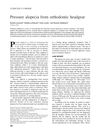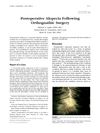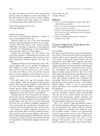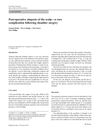Postoperative Permanent Pressure Alopecia
November 2015
in “
Journal of anesthesia
”
TLDR A woman permanently lost hair on her scalp after a long surgery.
A 49-year-old Chinese female experienced postoperative permanent pressure alopecia at the occipital area of the scalp following a 12-hour laparoscopic assisted Whipple’s surgery. This condition, although rare, was significant due to its permanence, contrasting with the typically temporary nature of pressure-induced hair loss after general anesthesia. The case highlighted the importance of recognizing and understanding the risk factors associated with this uncommon complication in the context of anesthesia and surgery.







